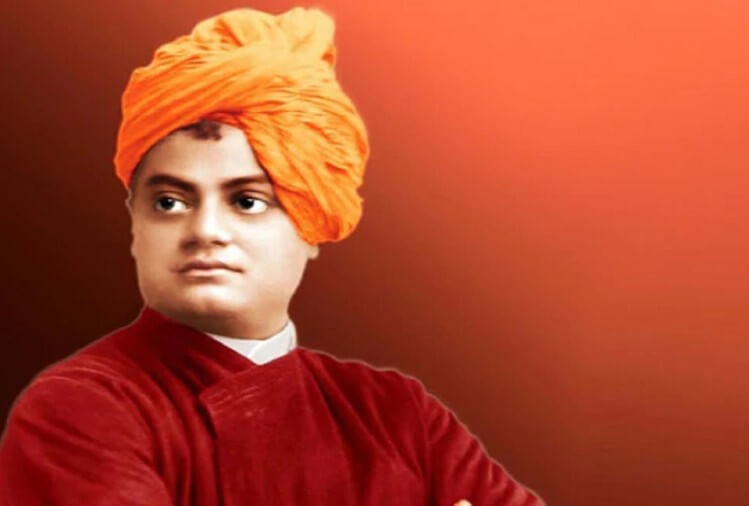Swami Vivekananda (born: January 12, 173 – Death: July 7, 1902) was a noted and influential spiritual master of Vedanta. His real name was Narendra Nath Dutt. He represented Sanatan Dharma on behalf of India at the World Religion General Assembly held in Chicago in 1893 in the US. Vedanta philosophy full of spirituality of India reached every country of America and Europe only because of the speech of Swami Vivekananda.
He established the Ramakrishna Mission which is still doing its work today. He was a well-qualified disciple of Ramakrishna Paramahamsa. He was given a time of 2 minutes, but he is primarily known for beginning his speech with “my American sisters and brothers”. [4] This first sentence of his address won everyone’s heart.
Born in an elite Bengali Kayastha family of Calcutta, Vivekananda was inclined towards spirituality. He was greatly influenced by his Guru Ramakrishna Dev from whom he learned that God exists in all beings; Therefore, mankind can help others who need other needs or can also serve God. After Ramakrishna’s death, Vivekananda visited the Indian subcontinent extensively and acquired direct knowledge of the prevailing conditions in British India. The World Parliament of Religions later departed for the United States in 1893, representing India. In India Vivekananda is considered as a patriotic monk and his birthday is celebrated as National Youth Day. Swamiji was of great personality.
Table of Contents
Story About Vivekanand – Focus on the goal
Once Swami Vivekananda was sleeping in his ashram. That was when a person came to him who was very unhappy and fell at the feet of Swami Vivekananda as soon as he came and said, Maharaj, I work very hard in my life, I do everything with a lot of heart, yet till date I have never been a successful person. Could become.
Swami Vivekananda, on hearing that person said, is fine. You brought this pet dog around for a while, till then I find a solution to your problem. After saying this, that person went to turn the dog. And then after some time the person came back. So Swami Vivekananda asked that person why this dog is panting so much. While you don’t seem tired even a little, what happened?
On this the person said that I was walking directly on my way, while this dog kept running all the way here and used to run anywhere. Because of which it is so tired.
Swami Vivekananda smiled and said that this is the answer to your questions. The floor of your success is right in front of you. But instead of your destination, you run here and there so that you could never succeed in your life. The person understood this after hearing this. If we want to be successful, then we should concentrate on our destination.
This story of Swami Vivekananda gives us the lesson that we have to do. Whatever it is to become. We do not pay attention to it, and we start doing the same by looking at others. Because of which we wander away while nearing our destination of success. That’s why if you want to succeed in life! So we should always focus on our goals!
Early life (1863-88)
Swami Vivekananda was born on 12 January 1873 (according to scholars on Makar Sankranti Samvat 1920) in a Kayastha family in Calcutta. His childhood home was named Vireshwar, but his formal name was Narendranath Dutt. Father Vishwanath Dutt was a famous lawyer of the Calcutta High Court. Durgacharan Dutta, (Narendra’s grandfather) Sanskrit He was a Persian scholar and left his family at the age of 25 and became a monk.
His mother Bhuvaneshwari Devi was a woman of religious views. Most of her time was spent in worshiping Lord Shiva. Narendra’s father and his mother’s religious, progressive and rational attitude helped shape his thinking and personality.
Since childhood, Narendra was very intelligent and very naughty. He used to do a lot of mischief with his fellow children and did not miss any mischief with his teachers when he got the chance. Mata Bhuvaneshwari Devi was very fond of listening to Puran, Ramayana, Mahabharata etc. due to her religious tendency.
Education
In 1871, at the age of eight, Narendranath enrolled in the Metropolitan Institute at Ishwar Chandra Vidyasagar where he went to school. In 1877 his family moved to Raipur. In 1879, after the return of his family to Calcutta, he was the only student to score first division marks in the Presidency College entrance examination.
Narendra was trained in Indian classical music, and regularly participated in physical exercise and sports. Narendra studied Western logic, Western philosophy, and European history at the General Assembly Institution (now Scottish Church College). In 1881 he passed the fine arts examination, and in 1884 completed a Bachelor of Arts degree.
Conference speech
My American brothers and sisters!
My heart is filled with indescribable joy while standing to show my gratitude for the warmth and affection with which you have welcomed us. I thank you on behalf of the oldest tradition of ascetics in the world; I thank the mother of religions; And I also thank on behalf of every category of Hindus of all sects and opinions.
I also express my thanks to some of the speakers who spoke on this forum, who while referring to the representatives of Prachi have told you that these people from far off countries can claim the pride of propagating the spirit of tolerance in various countries. . I feel proud to be a follower of a religion that has taught the world both tolerance and universal acceptance.
I take pride in telling you that we had placed in our chest the purest residue of the Jews who had come to South India and taken refuge in the year in which their holy temple was dusted by the tyranny of the Roman race. I feel proud to be a follower of a religion that gave shelter to the remnant of the great needy caste and which it has been following till now.

